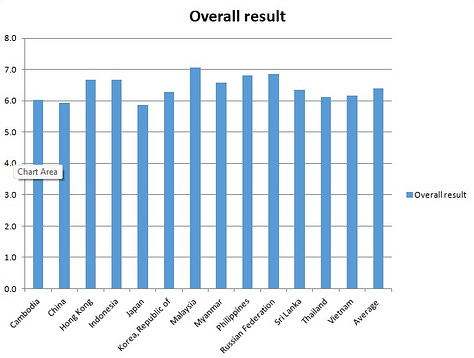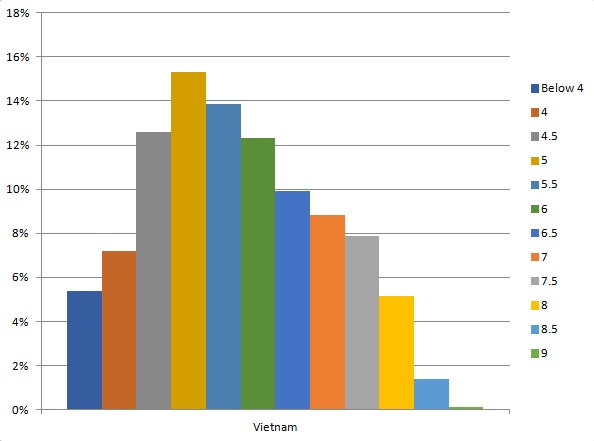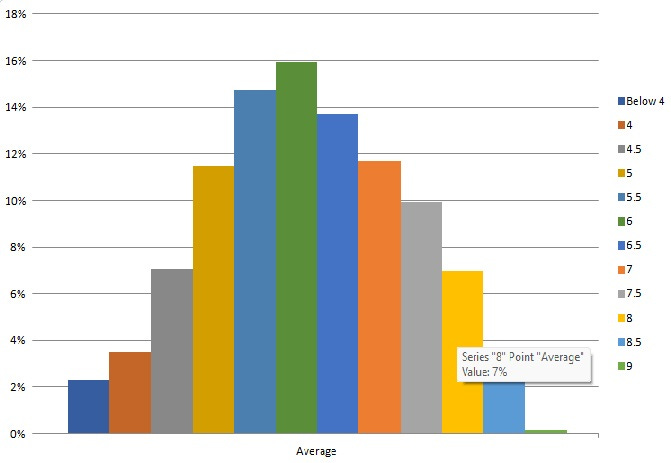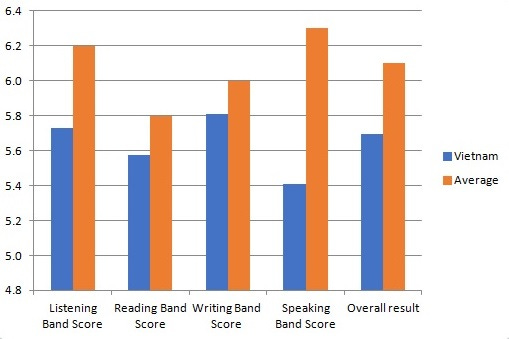According to a recent study by IELTS (International English Language Testing System), the preferred English proficiency test in Vietnam, the English proficiency of Vietnam has dropped from 23rd out of 40 countries in their 2022 survey to 29th out of 39 countries in their 2023-24 survey.
WOW! The English proficiency ranking dropped from around the halfway point to nearly the bottom 25% since the last survey!
An acquaintance of mine who works as an English teacher here in Vietnam was the first to bring this statistic to my attention while we were discussing how difficult the current Vietnamese visa policy is for English teachers versus the visa policy that existed prior to Covid. This steep decline in test scores was cited as proof that the Vietnamese visa policy targeting English teachers working illegally with tourist visas has been causing a sharp decline in listening and speaking proficiency of Vietnamese English students. I found this shocking and had to look further into the data.
Many people from native English speaking countries may not realize how important it is to speak English internationally. It opens up contact to international business. This isn’t merely Anglophile hubris, it is a fact of life for most of the world who wish to have contact outside of their home country. English is the most common primary or secondary language in the world which has caused it to become the language of business.
If a person doesn’t know English, they cannot communicate in the international business community.
English dominance started as a relic of colonialism and has grown in relevance as a result of Western business dominance. Some people may be surprised to realize the US alone typically represents 20-30% of global GDP in US dollars with historic highs around 40% of global GDP in the 1960’s. When you adjust for purchasing power parity, that factors in the purchasing power of the local currency, the strong US dollar causes that number to drop to a little over 15% of global GDP.1 The US is only one of many English speaking countries who speak English as their primary or secondary languages. This impressive figure is magnified when you add in other English speaking G20 countries such as Canada, the UK and India.2
As more people speak English, a self reinforcing cycle grows causing more English to be used as part of normal business. Contracts, trade journals and business conferences must be conducted primarily in English to appeal to the largest audience.
On an individual level, if a person doesn’t speak English, they will not have access to international education, they would not fully understand international law or international accounting standards and they may not have access to the most current technology. This likely leads to a skill disadvantage when individuals compete against other job candidates who speak English when the candidate applies to high paying international corporations. This is why Vietnam is so interested in having such a high percentage of their educated population learn English.
English equals a connection to international markets.
The Vietnamese government officially approved a policy which mandated the goal of 100% enrollment in a ten year English program for secondary school students from 2008-2020. This program never met the government goal of 100% enrollment, so the policy was extended until 2025 in hopes of achieving that goal.3 This goal became integrated into the high school entrance exam.
There are three aspects of the high school entrance exam: literature, math and a foreign language, with English being the preferred language. 4 This test score determines which public school a student may be admitted to. Higher test scores mean admission into better schools which may allow that student to attend their preferred university. 5 Ho Chi Minh City suggested the controversial policy of integrating an IELTS score into their admission requirements, with some schools requiring a 6.0 to 7.0 score for admission to some of the schools for gifted students. 6 IELTS 6.0 is considered by many to be a basic conversational level while 7.0 is considered a fully conversational level out of a possible score of 9.0. 7 Due to parental pushback, the policy of including IELTS test results as part of the admission requirements never became actual policy and the old reading and writing test remained official policy.
Despite the government policy encouraging greater English proficiency, Vietnamese student speaking proficiency is dropping. According to the recent study by IELTS that I mentioned earlier, scores in listening and speaking have fallen since the last study. In reading and writing, total Vietnamese scores matched the study average while listening and speaking scores are below the study average. Vietnamese listening scores are 6.3 versus an average score of 6.6 while Vietnamese speaking scores come in at 5.7 versus an average score of 6.3. These lower listening and speaking scores bring down the total Vietnamese score to 6.2, falling below the total average score of 6.4 of the countries surveyed. This caused a dramatic decrease in the national rankings since the previous survey, falling from 23rd out of 40 countries in 2022 to 29th out of 39 countries surveyed in 2023-2024.
If we graph the data, we see two interesting bell curves. The Vietnamese bell curve is skewed toward lower test scores with a mean of 6.2 and a mode of 5. When compared to the total population, the bell curve appears to be a normal distribution with the mean and mode both hovering around 6. The data seems to indicate overall poor student performance among Vietnamese students.
If we look at data of test takers from another data set who take the test for general training rather than as part of an academic program, the situation appears even more dire with the average score 0.4 below the average of 6.1, reading and writing are both below the study average by 0.2 points with a study average of 5.8 and 6.0 points respectively. Listening is 0.5 points below the average of 6.2 while speaking is 0.9 points below the average of 6.3.
We might find better context to this data if we compare Vietnamese student test scores to other countries in the region. Around SE Asia, Vietnam performed nearly the worst in the region with only Thailand and Cambodia scoring lower. However, if you include the East Asia countries of Japan and China, they each only earned an average score of 5.9 with both countries earning scores of 5.9 in listening and 5.5 in speaking which Vietnam beat by several points in each category. 8



My acquaintance appears to be correct when he states Vietnamese test scores are slipping. English skills that are taught in a textbook such as reading and writing are maintaining the average score of other countries surveyed while listening and speaking skills are dropping dramatically.
If we want a clear answer for the visa hypothesis, we would need to know how many English teachers there were in Vietnam before and after Covid. This question would likely never be answered because many of these teachers worked illegally, leaving no data for comparison.
It seems likely that the cause of the problem is a lack of native English teachers coming to Vietnam but there could be other contributing factors. Native English teachers were evacuated from Vietnam for 27 months during Covid 9. This created a bottleneck of pent-up demand for native speakers giving the appearance of a teacher shortage when in-fact the problem could merely be short term. But wouldn’t this cause lower speaking and listening test scores among other countries who had similar problems?
An additional factor that could skew the data is the number of beginning students. Has the Vietnamese English policy added a large number of new students who are taking the IELTS test? This could easily affect the data if there are many students taking the test who have no intention of learning English beyond a lower level sufficient to enter a good high school.
Whether it is a short or long term problem, it seems clear more native English teachers need to be recruited to teach in Vietnam if the government hopes to obtain their English proficiency goal. I plan to keep following this story to see if these low test scores are a long term or short term trend.
Notes:
https://www.visualcapitalist.com/u-s-share-of-global-economy-over-time/
https://www.statista.com/statistics/270267/united-states-share-of-global-gross-domestic-product-gdp/
https://en.wikipedia.org/wiki/G20
https://thuvienphapluat.vn/van-ban/EN/Giao-duc/1400-QD-TTg/83815/tieng-anh.aspx
https://tuoitre.vn/tp-hcm-khong-tuyen-thang-cong-diem-uu-tien-thi-sinh-co-chung-chi-ielts-trong-thi-lop-10-2024022511591276.htm
https://hanoitimes.vn/students-in-hanoi-sit-for-the-10th-grade-entrance-exam-323928.html
https://tuoitre.vn/tuyen-sinh-lop-10-uu-tien-ielts-co-dong-tinh-co-phan-doi-20240228101104529.htm
https://tuoitre.vn/tp-hcm-khong-tuyen-thang-cong-diem-uu-tien-thi-sinh-co-chung-chi-ielts-trong-thi-lop-10-2024022511591276.htm
https://tuoitre.vn/4-0-ielts-duoc-tinh-10-diem-xet-tot-nghiep-can-cu-nao-de-quy-doi-20230418234511573.htm
https://yourielts.net/ielts-exam/ielts-band-scores
https://ielts.org/researchers/our-research/test-statistics
Vietnam closed the borders to tourist travel due to Covid 19 from March of 2020 until June of 2022






I doubt the lack of native teachers in Vietnam would have too much impact, except on perhaps on the youngest students. People who missed opportunities to study abroad might be a factor. During COVID people became comfortable with online teachers. They may get more access to natives as a result. I agree that an expanded pool of people who actually take the test is a major factor.
There’s a lot to unpack here but the lower test scores don’t correlate to a lack of English teachers. There was a large crackdown on ‘back packer’ teachers who were often teaching without a degree and other necessary documents. Yes, Covid saw a large exodus of teachers – qualified and unqualified – but many have returned.
The visa rules were ‘tightened’ up but if you work for a proper school and/or language centre, and have the requisite qualifications then the process isn’t too bad. I’ve been teaching out here for five years (public schools, centres, universities) and, if anything, there’s a push to rely less on foreign teachers and more on (often very capable) local teachers.
The real scandal lies within the IELTS system which has created a culture of teaching to test over real language acquisition. Not to mention the millions of dollars drained from Vietnamese parents who will often spend more than they earn on English lessons.